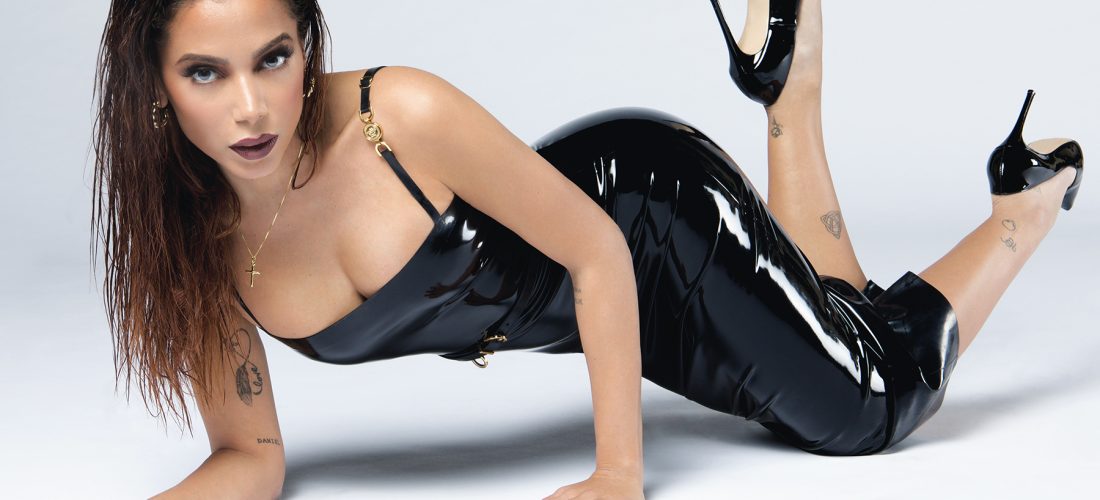Anitta’s ‘Versions of Me’ Is a Tirelessly Bewitching Global Dance-Floor Experience
Are you a part of Anitta’s Algorithm Nation? On Versions of Me, a dazzling omnibus of pop digitalia, the 29-year-old Brazilian singer-MC-dancer goes door-to-door, trying to unite the people behind her surging campaign for Global Dance-Floor Booty Inspector. Burning brightest when micromanaging every market-tested and quantized musical detail with blissfully canny zeal, Anitta pinches your cheek while monitoring her streaming numbers. Like a social media feed in fidgety human form, she tirelessly bewitches even the surliest doomscrollers. Resist her at your peril!
To wit: On the taunting, four-on-the-floor title track, she calmly chirps and purrs “I’m in your mind and you’re caught up in my drama.” Written by Bibi Bourelly, who gifted Rihanna with “Bitch Better Have My Money,” and produced by Rami, a protégé of star maker Max Martin, this blippy reverie burbles along as Anitta sings about smashing windows and slashing tires. “It wasn’t me/It was a maniac,” she coos.
Personal freedom for Anitta means seizing control, pursuing pleasure, exploding the fear and repression around sex and gender, while reserving the right to be a picky, line-stepping kook. She identifies as bisexual and proudly LGBTQ. Second, if this song isn’t a hit, somebody at Warner Records needs their windows smashed.
Waving from a Carnaval float of songwriters and studio mavens — Grammy winners, genre aces, upstarts who defy Google search — the self-proclaimed Girl from Rio and her executive producer Ryan Tedder serve up a sterling tray of top-shelf, pan-Latin product. She gorilla-grips reggaeton, pop’s recent cutting edge, like it’s her long-lost rhythm of the night. “Envolver” is streamlined to gleaming efficieny by Subelo NEO (the Puerto Rican duo behind Bad Bunny’s YHLQMDLG). Anitta sweetly spices up the track’s low-key swoon, talking dirty, grinding on a Moroccan model-dancer in the video, and going viral on TikTok, where she has almost 18 million followers (61 million on Instagram). Boosted by more hired guns, “Gata” and “Me Gusta” bounce and strut with staccato gusto. Plan B veteran Chencho Corleone assists on the former, Myke Towers on the latter. And, of course, Cardi B tornados in, spitting fire.
She signs up “Despacito” producers Andrés Torres and Mauricio “Dandee” Rengifo for three tracks (including “Me Gusta”). Elsewhere, there are nimble, R&B-tinged escapades, one with Ty Dolla $ign, who makes blatant the “La Bamba” sway and shake of flirty pas de deux “Gimme Your Number”; and Khalid, who croons hypnotically over spectral reggaeton pitter-pat on “Ur Baby.” Echoing the title track, we get an additional double-shot of Eurocentric gloss, with insinuating, self-aware electro-pop heartache (“Love You”); and romping EDM (“Boys Don’t Cry”) which targets guys who mistake desire for romance. Lady Gaga, Madonna, and even Charli XCX would give their left eye tuck for material this irresistible. But it’s Anitta’s uniquely relatable voice — unguarded, blithely confident, endlessly versatile — that makes it all click.
There are only fleeting traces here of funk carioca or baile funk, the party music of Rio’s most destitute, marginalized, and predominantly black zones, a.k.a. the favelas, that transformed a poor, vulnerable mestiça (mixed-race) kid who sang in the church choir to “MC Anitta”, the powerful, fearless, shape-shifting whirlwind. She’s been a staunch ambassador for funk culture ever since. But here, the funk is mainly confined to “Que Rabão,” a raucous lark featuring three Brazilian artists who have also broadened the genre’s scope — trap-funk producer and sampling whiz Papatinho; singer-MC Kevin o Chris, whose baile funk hit “Ela é do Tipo” motivated Drake to jump on a remix; and the late, chortling free spirit Mr. Catra, an actor-singer whose recording career dates to the Nineties. Anitta eases into “Que Rabão,” flowing with a wry, relaxed swagger over a fabulously dinky, plinky beat. Catra hoots in response and a squishy 808 claps along. For an instant, her commitment to airtight craft gives way to a moment of playful spontaneity.
There are certainly a lot of Anittas to navigate, as demonstrated by the album cover: six hauntingly lifelike busts that reflect the singer’s moods, roles, personas, and enthusiasm for cosmetic surgery. For better or worse, she has been compulsively transparent about all of it. And from her first career-defining singles — 2013’s fiercely womanist kiss-off “Eu Vu Ficar” (“I’ll Stay”) and the anthemic “Show das Poderosas” (“Powerful Girls Show”) — the stated strategy and goal has been to mix Brazilian funk with international pop, earn a global platform, and help spotlight Brazilian culture in the process.
The last time Brazil captivated American pop culture was in the early 1960s, when “The Girl from Ipanema” became a phenomenon (Anitta recasts it on Versions of Me as a summery trap-pop stroll on “Girl from Rio”). Recorded by American saxophonist-bandleader Stan Getz, featuring Brazilian singer Astrud Gilberto and her husband João, “Ipanema” sparked a craze for bossa nova, the smooth, pop-jazz restyling of samba (some have called it a “whitewash”). Despite its fraught reputation in Brazil, bossa nova led generations to explore the country’s music. Will Anitta’s sprinkling of favela-funk dust around the periphery of her ambitions have a similar effect? Some may harbor doubts, but Anitta has the talent — and data — she needs.
